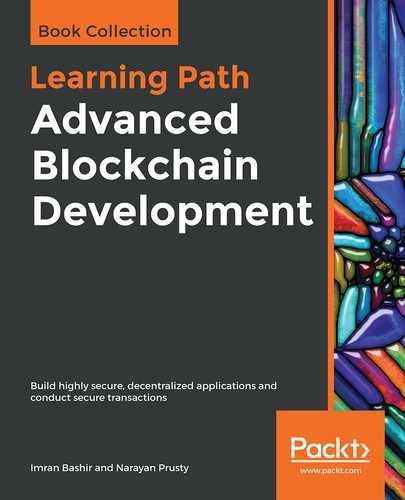Decentralization of computing or processing power is achieved by a blockchain technology such as Ethereum, where smart contracts with embedded business logic can run on the blockchain network. Other blockchain technologies also provide similar processing-layer platforms, where business logic can run over the network in a decentralized manner.
The following diagram shows a decentralized ecosystem overview. At the bottom layer, the internet or Meshnets provide a decentralized communication layer. On the next layer up, a storage layer uses technologies such as IPFS and BigchainDB to enable decentralization. Finally, at the next level up, you can see that blockchain serves as a decentralized processing (computation) layer. Blockchain can, in a limited way, provide a storage layer too, but that severely hampers the speed and capacity of the system. Therefore, other solutions such as IPFS and BigchainDB are more suitable to store large amounts of data in a decentralized way. The Identity, Wealth layers are shown at the top level. Identity on the internet is a vast topic, and systems such as BitAuth and OpenID provide authentication and identification services with varying degrees of decentralization and security assumptions:

The blockchain is capable of providing solutions to various issues relating to decentralization. A concept relevant to identity known as Zooko's Triangle requires that the naming system in a network protocol be secure, decentralized, and is able to provide human-meaningful and memorable names to the users. Conjecture has it that a system can have only two of these properties simultaneously. Nevertheless, with the advent of blockchain in the form of Namecoin, this problem was resolved. It is now possible to achieve security, decentralization, and human-meaningful names with the Namecoin blockchain. However, this is not a panacea, and it comes with many challenges, such as reliance on users to store and maintain private keys securely. This opens up other general questions about the suitability of decentralization to a particular problem.
Decentralization may not be appropriate for every scenario. Centralized systems with well-established reputations tend to work better in many cases. For example, email platforms from well reputed companies such as Google or Microsoft would provide a better service as compared to a scenario where individual email servers are hosted by users on the internet.
There are many projects underway that are developing solutions for a more comprehensive distributed blockchain system. For example, Swarm and Whisper are developed to provide decentralized storage and communication for Ethereum blockchain.
With the emergence of the decentralization paradigm, different terminologies and buzzwords are now appearing in the media and academic literature. With the advent of blockchain technology, it is now possible to build software versions of traditional physical organizations in the form of Decentralized Organizations (DOs) and other similar constructs, which we will examine in detail shortly.
The following concepts are worth discussion in the context of decentralization.
